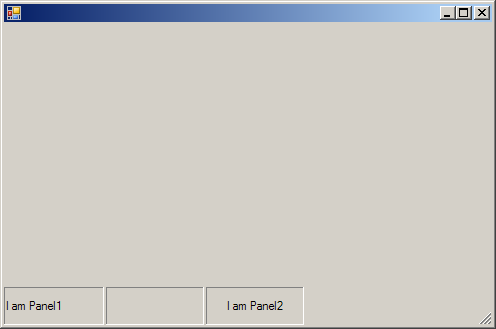
Option Strict On
Imports System.Windows.Forms
Imports System.Drawing
Imports System.Drawing.Drawing2D
public class StatusBarPanelAddAction
public Shared Sub Main
Application.Run(New Form1)
End Sub
End class
Public Class Form1
Inherits System.Windows.Forms.Form
#Region " Windows Form Designer generated code "
Public Sub New()
MyBase.New()
'This call is required by the Windows Form Designer.
InitializeComponent()
'Add any initialization after the InitializeComponent() call
End Sub
'Form overrides dispose to clean up the component list.
Protected Overloads Overrides Sub Dispose(ByVal disposing As Boolean)
If disposing Then
If Not (components Is Nothing) Then
components.Dispose()
End If
End If
MyBase.Dispose(disposing)
End Sub
Friend WithEvents StatusBar1 As System.Windows.Forms.StatusBar
Friend WithEvents StatusBarPanel1 As System.Windows.Forms.StatusBarPanel
Friend WithEvents StatusBarPanel2 As System.Windows.Forms.StatusBarPanel
Friend WithEvents StatusBarPanel3 As System.Windows.Forms.StatusBarPanel
'Required by the Windows Form Designer
Private components As System.ComponentModel.IContainer
'NOTE: The following procedure is required by the Windows Form Designer
'It can be modified using the Windows Form Designer.
'Do not modify it using the code editor.
Friend WithEvents btnMoveControls As System.Windows.Forms.Button
<System.Diagnostics.DebuggerStepThrough()> Private Sub InitializeComponent()
Me.components = New System.ComponentModel.Container()
Me.StatusBar1 = New System.Windows.Forms.StatusBar()
Me.StatusBarPanel1 = New System.Windows.Forms.StatusBarPanel()
Me.StatusBarPanel3 = New System.Windows.Forms.StatusBarPanel()
Me.StatusBarPanel2 = New System.Windows.Forms.StatusBarPanel()
CType(Me.StatusBarPanel1, System.ComponentModel.ISupportInitialize).BeginInit()
CType(Me.StatusBarPanel3, System.ComponentModel.ISupportInitialize).BeginInit()
CType(Me.StatusBarPanel2, System.ComponentModel.ISupportInitialize).BeginInit()
Me.SuspendLayout()
'
'StatusBar1
'
Me.StatusBar1.Location = New System.Drawing.Point(0, 262)
Me.StatusBar1.Name = "StatusBar1"
Me.StatusBar1.Panels.AddRange(New System.Windows.Forms.StatusBarPanel() {Me.StatusBarPanel1, Me.StatusBarPanel3, Me.StatusBarPanel2})
Me.StatusBar1.ShowPanels = True
Me.StatusBar1.Size = New System.Drawing.Size(488, 40)
Me.StatusBar1.TabIndex = 0
Me.StatusBar1.Text = "StatusBar1"
'
'StatusBarPanel1
'
Me.StatusBarPanel1.Text = "I am Panel1"
'
'StatusBarPanel2
'
Me.StatusBarPanel2.Alignment = System.Windows.Forms.HorizontalAlignment.Center
Me.StatusBarPanel2.Text = "I am Panel2"
'
'Form1
'
Me.AutoScaleBaseSize = New System.Drawing.Size(5, 13)
Me.ClientSize = New System.Drawing.Size(488, 302)
Me.Controls.AddRange(New System.Windows.Forms.Control() {Me.StatusBar1})
CType(Me.StatusBarPanel1, System.ComponentModel.ISupportInitialize).EndInit()
CType(Me.StatusBarPanel3, System.ComponentModel.ISupportInitialize).EndInit()
CType(Me.StatusBarPanel2, System.ComponentModel.ISupportInitialize).EndInit()
Me.ResumeLayout(False)
End Sub
#End Region
Private Sub StatusBar1_PanelClick(ByVal sender As System.Object, _
ByVal e As System.Windows.Forms.StatusBarPanelClickEventArgs) _
Handles StatusBar1.PanelClick
Select Case StatusBar1.Panels.IndexOf(e.StatusBarPanel)
Case 0
MsgBox("You clicked StatusBarPanel1!")
Case 1
MsgBox("You clicked StatusBarPanel2!")
Case 2
MsgBox("You clicked StatusBarPanel3!")
Case 3
MsgBox("You clicked myPanel!")
End Select
StatusBar1.Panels.Add(Now.ToShortTimeString)
StatusBar1.Panels(3).AutoSize = StatusBarPanelAutoSize.Spring
StatusBar1.Panels(3).BorderStyle = StatusBarPanelBorderStyle.Sunken
StatusBar1.Panels(0).Text = "EARTH"
StatusBar1.Panels(0).Text = "SUN"
End Sub
End Class